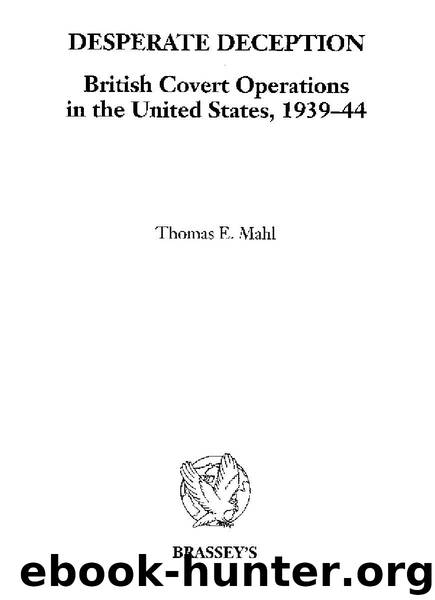Desperate Deception: British Covert Operations in the United States, 1939-44 (Brassey's Intelligence & National Security Library) by Mahl Thomas E

Author:Mahl, Thomas E. [Mahl, Thomas E.]
Language: eng
Format: epub
Publisher: Potomac Books
Published: 2000-01-13T00:00:00+00:00
CHAPTER 7
Uncle Arthur
There is no question that the British planted Kay Summersby, the British WAC, on Eisenhower, and there was the neat way in which the British foisted Mitzi Sims, wife of the Canadian counselor, on Sen. Arthur Vandenberg and later, the attractive British widow, Mrs. Paterson [sic].
—Drew Pearson1
British intelligence operations on Senator Arthur Vandenberg were based on a very simple human assumption—those who are sleeping with a senator are most likely to have his ear. In recent years the American public has been treated to a catalog of hairdressers, movie stars, models, and would-be models whose liaisons with statesmen and would-be statesmen have enlivened the pages of the national press. There is a major difference, however, between the amorous revelations of the recent past and those of this account of the World War II era.
With the possible exception of Judith Campbell Exner, John F. Kennedy’s paramour, who acted as a courier between Kennedy and the Mafia, none of these recently revealed lovers was the emissary of a great power. They were, by most accounts, independent and unaffiliated United States citizens, not special pleaders for a foreign power. Their endeavors posed little threat to the political direction of the state.
The bedmates discussed in this chapter are something quite different: they were the covert intelligence agents and lobbyists of a foreign power. Although other high officials and even office workers were targeted for similar attention by British intelligence, this chapter explores the efforts made to track and influence Senator Arthur Vandenberg, Republican of Michigan.
Senator Vandenberg’s disposition toward the British was extremely important to them during the period 1939-49, and had he won the Republican presidential nomination in 1940, it would have been even more important. Certainly his attitude toward Great Britain would not be allowed to dangle on mere chance or personal whim, particularly when there were such fine opportunities to give chance and whim a nudge.
To some extent these women operated as moles, ferreting out information from Senator Vandenberg and his colleagues, but far more important, they were “agents of influence.” Ernest Cuneo, code name Crusader, the liaison between British intelligence, the White House, OSS, the Treasury, and the Justice Department, was quite correct when he wrote: “An Agent of Influence is rated far above even the mightiest ofMoles.”2
Historians have long noted that Vandenberg, a prominent isolationist in the late 1930s, had a surprising change of heart in the mid-1940s. Thereafter he helped champion the legislation that involved the United States in the affairs of the world and prevented it from retreating into itself after World War II. In a 1962 article in The New Yorker, Richard H. Rovere wrote: “It was Vandenberg’s conversion from isolationism... that made him a large figure in the postwar world. Without his help, it is at least conceivable that Roosevelt and Truman would have suffered the fate of Woodrow Wilson.”3
Before recent times the private adventures of prominent politicians were not seen as fit subjects for the legitimate press. New York Times political reporter R. W.
Download
This site does not store any files on its server. We only index and link to content provided by other sites. Please contact the content providers to delete copyright contents if any and email us, we'll remove relevant links or contents immediately.
| Africa | Americas |
| Arctic & Antarctica | Asia |
| Australia & Oceania | Europe |
| Middle East | Russia |
| United States | World |
| Ancient Civilizations | Military |
| Historical Study & Educational Resources |
Flight by Elephant(1525)
The Rise and Fall of the Third Reich: A History of Nazi Germany by William L. Shirer(1416)
Unbroken: A World War II Story of Survival, Resilience, and Redemption by Hillenbrand Laura(1150)
German submarine U-1105 'Black Panther' by Aaron Stephan Hamilton(1055)
Last Hope Island by Lynne Olson(962)
A Bridge Too Far by Cornelius Ryan(953)
War by Unknown(943)
The Victors - Eisenhower and His Boys The Men of World War II by Stephen E. Ambrose(932)
Rogue Heroes: The History of the SAS, Britain's Secret Special Forces Unit That Sabotaged the Nazis and Changed the Nature of War by Ben Macintyre(926)
The Guns at Last Light: The War in Western Europe, 1944-1945 by Rick Atkinson(922)
0060740124.(F4) by Robert W. Walker(895)
The Hitler Options: Alternate Decisions of World War II by Kenneth Macksey(891)
The Railway Man by Eric Lomax(873)
All the Gallant Men by Donald Stratton(840)
Hitler's Vikings by Jonathan Trigg(837)
A Tragedy of Democracy by Greg Robinson(833)
The Battle of Berlin 1945 by Tony Le Tissier(832)
Churchill's Secret War by Madhusree Mukerjee(827)
Hitler's Armies by Chris McNab(808)
